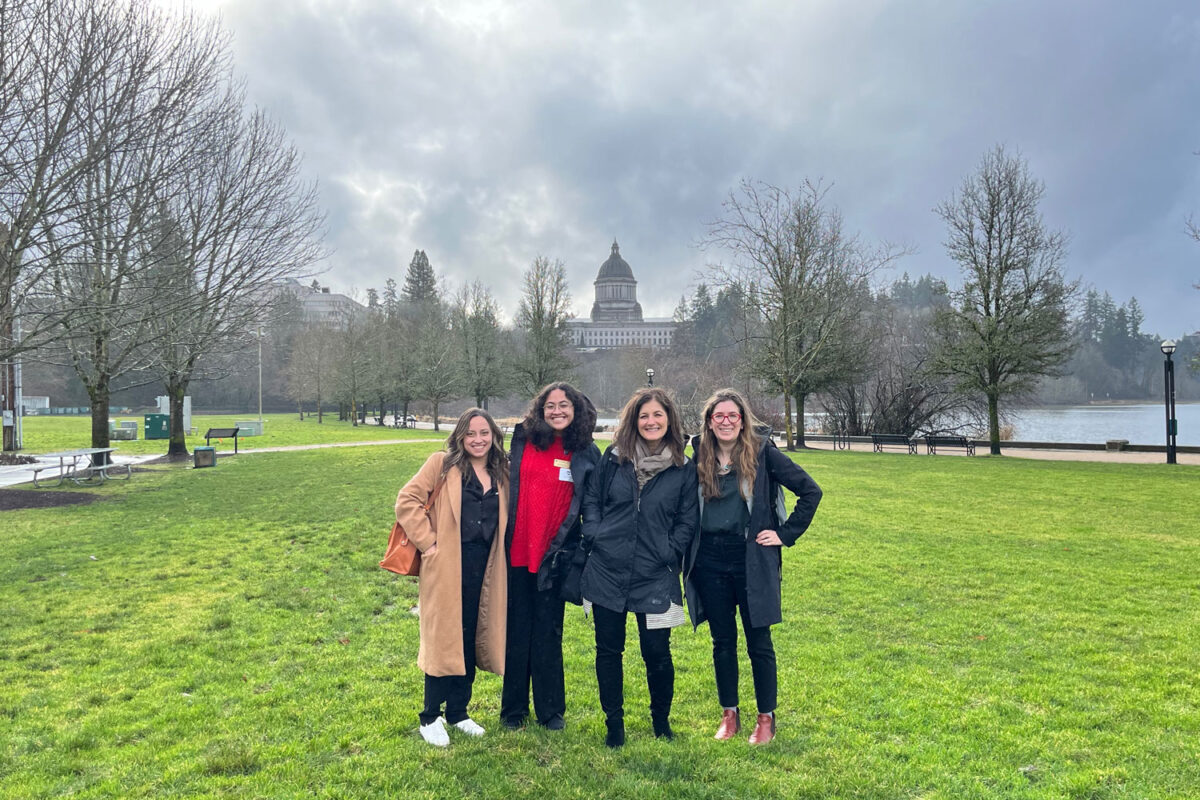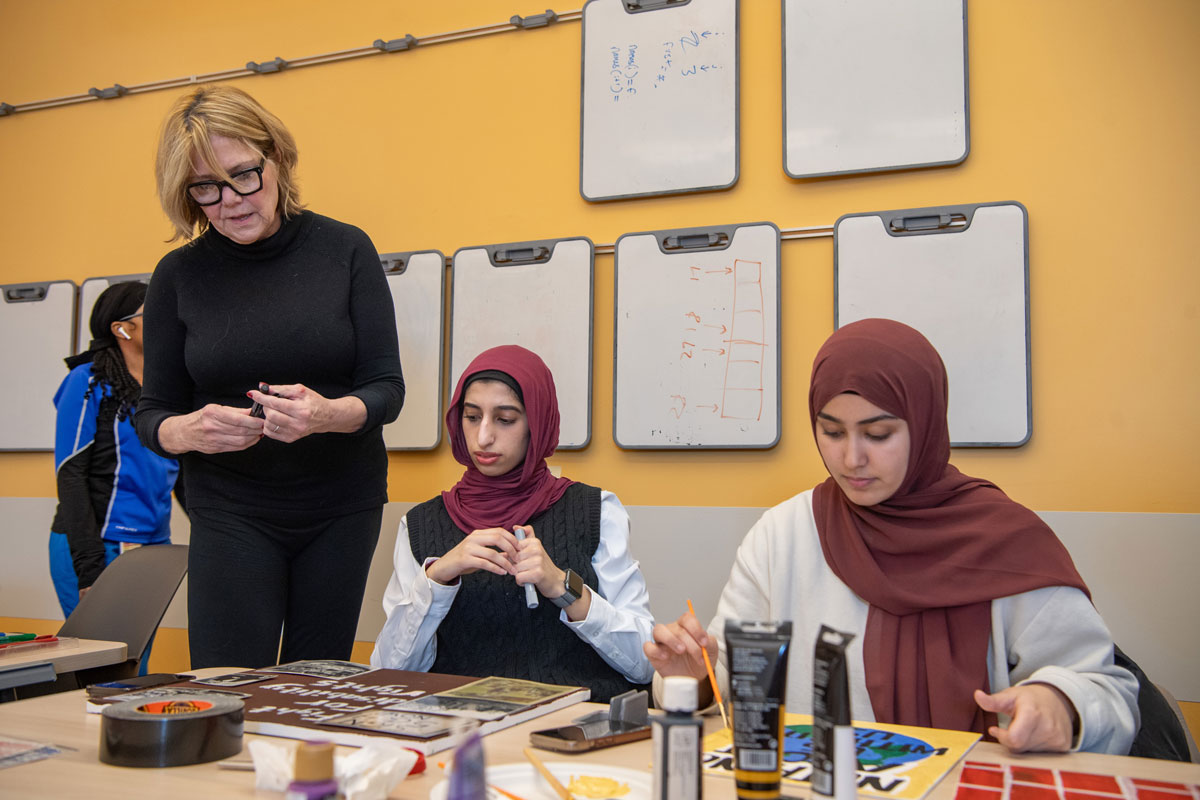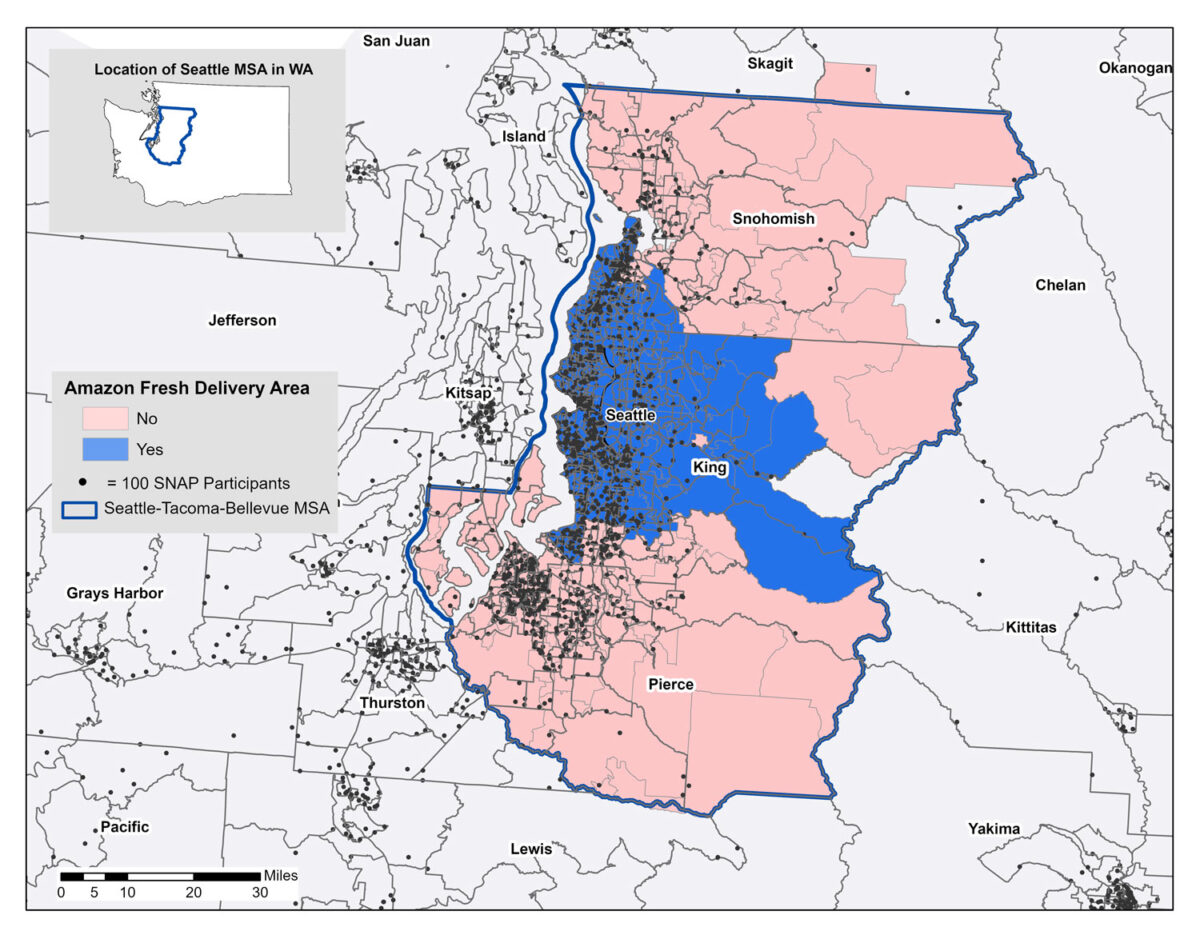First launched in autumn 2023 with a cohort of 18 students, the Master of Science in Community Health & Social Justice program at the University of Washington Bothell aims to support the urgent need for health professionals who understand the root causes of inequities — and have the education and skills to address them.
“The program is really about looking at creating systems-level change,” said Dr. Jody Early, professor in the School of Nursing & Health Studies. “In order to do that, it’s natural that you would need to be able to look at public policy, which has some of the greatest impacts on public health.”
To give students a real-world view of how policies are enacted and what role they can play in affecting change, program faculty looked to the state’s Capitol. And on Jan. 24, these students joined public health professionals and other students from around the state at the Capitol Building in Olympia for the 2024 Legislative Education Day.
“Giving students an opportunity to get to know legislators and proposed laws, and try to understand the different sides of the argument empowers them in their everyday lives,” Early said. “They see how policy works on the ground and how they can have the opportunity, even in their districts, to make appointments with legislators and talk about things that are important to them and for public health.”
A perfect partnership
The Washington State Public Health Association began hosting Legislative Education Day in 2011 as an opportunity to engage with lawmakers and learn about the legislative process while educating legislators on important public health issues.
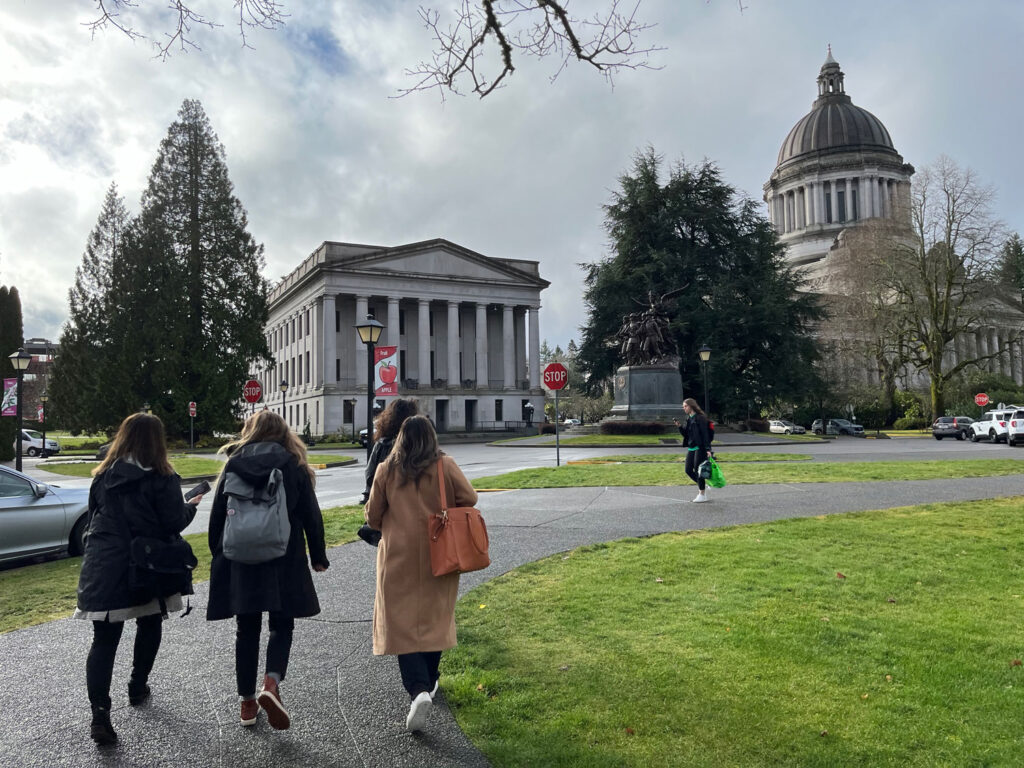
“We really wanted to find a community partner who could work with students so that they could get some hands-on project experience related to the topics of our classes,” said Dr. Nora Kenworthy, associate professor in the School of NHS. “It was kind of a match made in heaven.”
Together, Kenworthy and Early worked with WSPHA as a community partner both in the curriculum and for the annual event.
“It’s a great way for students to get out and have real-world experience,” said Megan Moore, WSPHA executive director. “If you’re interested in policy and you need to know the process, having someone guide you through it is such a great opportunity.”
The emphasis on education of the event in Olympia is an important distinction from lobbying, she added, as it allows employees in the public sector to participate and inform lawmakers about public health issues.
Making it personal
Students spent the first few weeks of January in teams learning about specific bills related to public health and tracking them throughout the legislative session, which happens to overlap with winter quarter. For each bill, they then prepared an advocacy toolkit, which included 60-second video stories, to deliver key information.
“Your legislator really is your neighbor, and you never know when you might run into them at the grocery store or wherever,” Moore said. “Having that 60-second story ready to go in your head in this fast and concise way can be really effective.”
For her 60-second story on House Bill 2058 — a bill to increase student access to free meals served at public schools — student Jacqueline Richards drew from her personal experiences.
She grew up in Fresno, California, where more poor and predominantly Black and mixed-race neighborhoods are clearly divided from the more wealthy and mostly white parts of the city. When both her mother and father were diagnosed with chronic illnesses, she also recalls the struggle they went through to receive proper care as well as the stress and medical debt that followed.
Addressing inequities
During her undergraduate studies at the University of California Berkley, Richards discovered a passion for studying public health. She completed a double major in Psychology and in Public Health, and then decided to continue her education in UW Bothell’s Community Health & Social Justice master’s program.
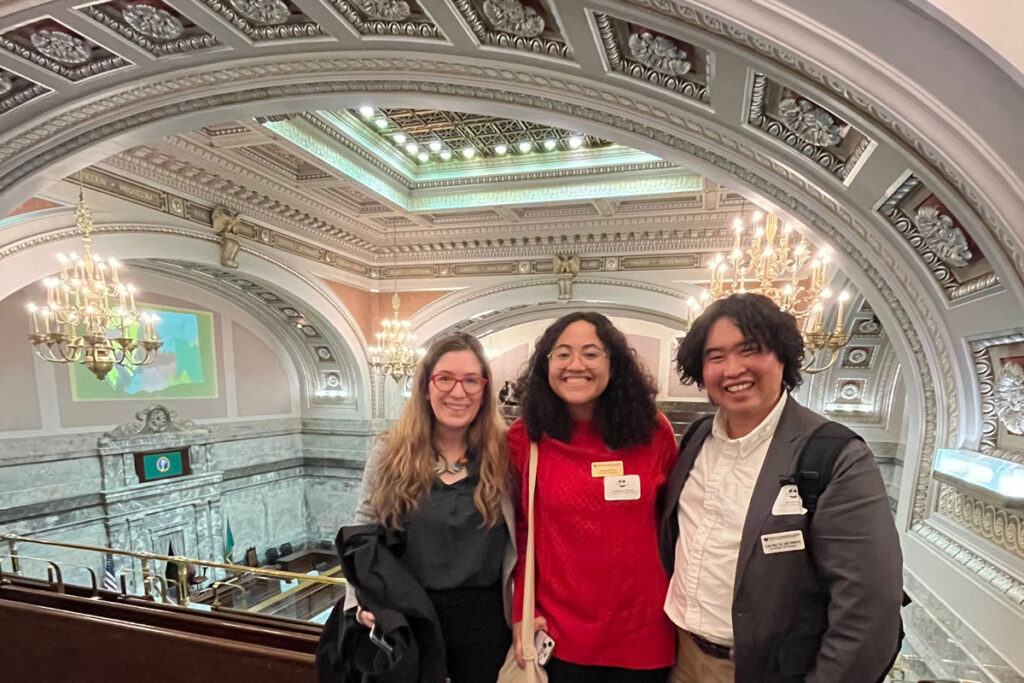
“I felt like it was the place for me,” she said. “I’m really interested in getting a degree that allows me to pursue health policy where I can increase mental health access for communities of color, and this seemed like a great program for that.”
When given the opportunity to select a bill to follow, H.B. 2058 stood out for her as both Richards and her brother had often gone hungry during the school day as children. It wasn’t until her mother received disability status that they met the qualifications for free meals, she said.
“My parents noted a significant change in how I felt going to school and coming back after school because I was able to pay attention and enjoy class rather than just being hungry,” Richards said. “I think a lot of students might have the same issues where they’re not able to focus or learn as well because they are worried about where their next meal is coming from.
“The legislators really resonated with my personal experience.”
I’m really interested in getting a degree that allows me to pursue health policy where I can increase mental health access for communities of color, and this seemed like a great program for that.
Jacqueline Richards, student, Master of Science in Community Health & Social Justice
Empowered to speak up
Once in Olympia, students spent the morning receiving training about how best to educate legislators and avoid lobbying. They also heard from legislators and activists working on core public health issues in this session’s agenda. In the afternoon, they met with legislators from various districts where they had the opportunity to speak about specific bills they chose to study in depth.
“Asking students to participate in Legislative Education Day is not only asking them to talk to strangers but to talk to some pretty intimidating people,” Kenworthy said. “One of the best things to come out of it was for them to realize ‘I can do this.’ Those conversations that they’re having and watching in real time, those conversations can open doors.
“To have that experience, I think, can be transformational and empowering.”
For Sydney Pope, the pre-work done in class paid off in an unexpected way when she found herself having to talk one-to-one with a legislator after her teammates were unable to attend the event. On her own, she spoke about House Bill 2157, which would redefine the state’s legal definition of “vaccine” that currently prevents the state from buying RSV (Respiratory Syncytial Virus) immunizations.
“I was able to effectively talk to a legislator on little notice. The class and the research on the bill beforehand really prepared me for that. When I opened my mouth all that knowledge just came out,” Pope said.
“I’m super introverted and was expecting it to be a terrifying experience, but it turned out to be really fun. And it’s great to know that we can talk to our local legislators.”
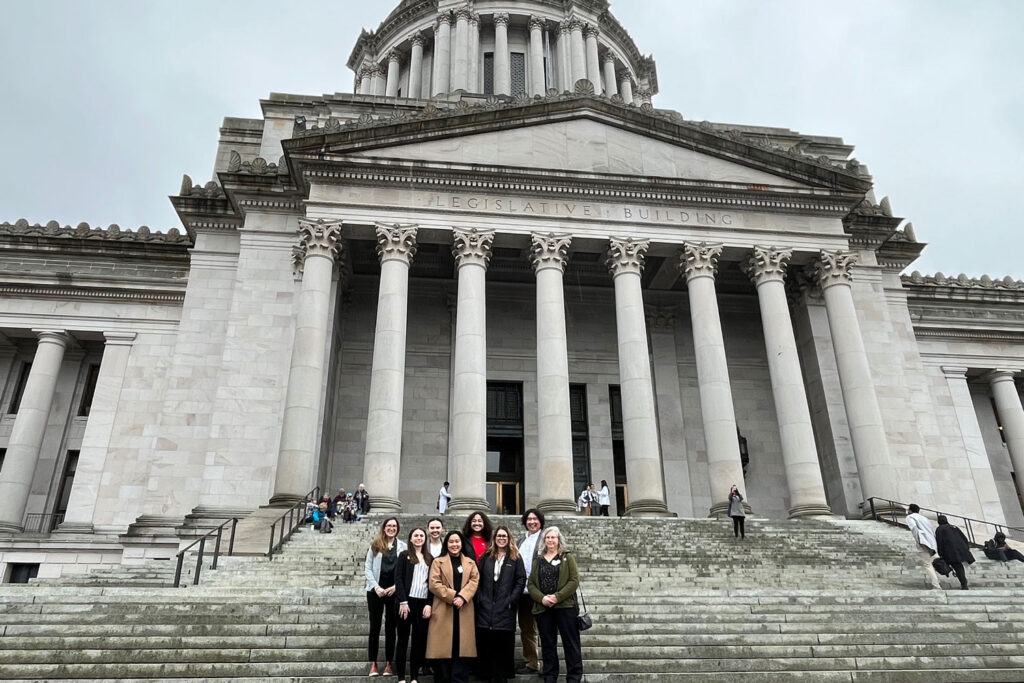
Just the beginning
The student meetings and presentations are an important part of Legislative Education Day, even beyond the learning experience they get from them, Kenworthy said.
“I’ve heard some really powerful stories from our students, and they bring such a wealth of experience and expertise into our program,” she said. “It’s so incredible to watch them learn how to leverage that, along with powerful data, to really deliver an impactful message.”
For students in the Community Health & Social Justice program, participating in Olympia this year is just the beginning. The cohort hopes to expand on their engagement with the 2025 legislative session and to continue growing their partnership with WSPHA.
“The best thing about the event, for me,” Moore said, “is when you can see it in the students’ eyes that they are inspired and the people in the room are just glowing. They’re like, ‘I can change the world, and I am inspired to make change’ — and their faces light up.
“When you can see that glow,” she said, “that’s how I know that it was a great day.”
